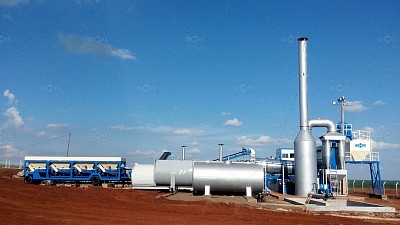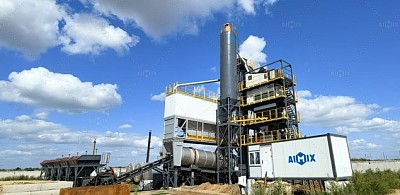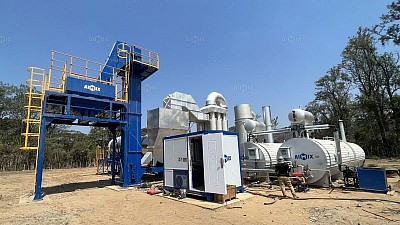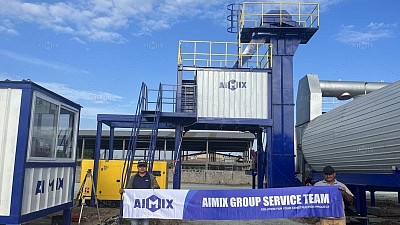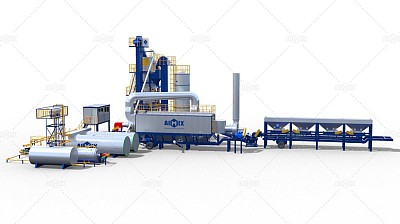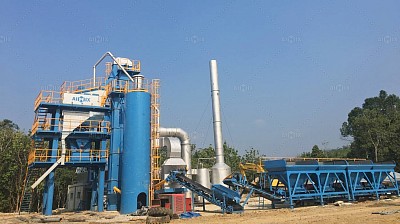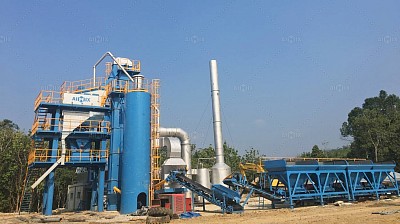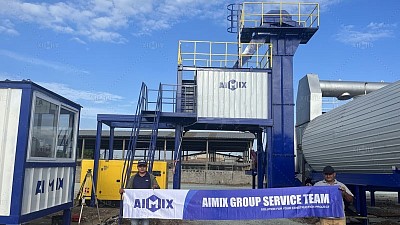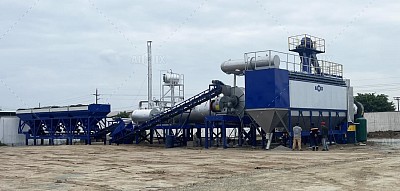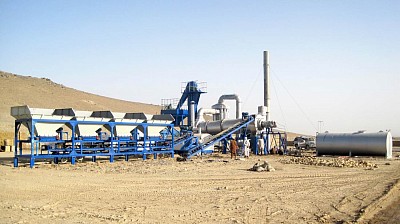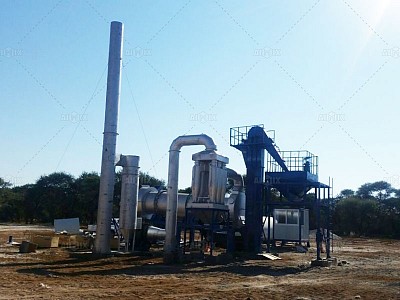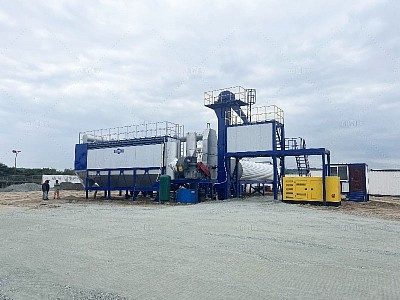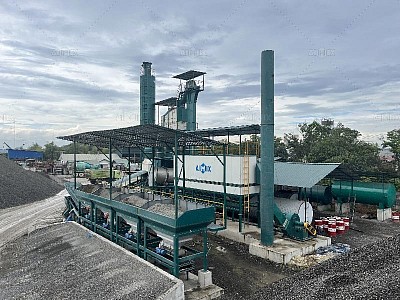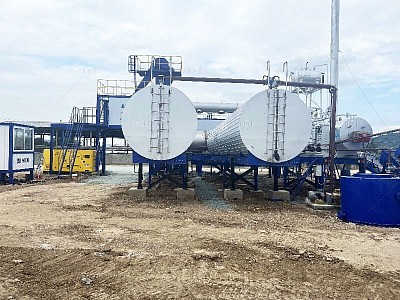Asphalt Mixing Plant Functions
Asphalt Plant Investment Payback Cycle Analysis and Cost Control Strategy
In the highly competitive road and bridge construction industry, efficient equipment investment is crucial for ensuring project profitability. Among all construction assets, the asphalt plant stands out as a major capital expenditure, directly influencing production efficiency, mix quality, and long-term cost structures. Understanding the payback cycle and developing a robust cost control strategy are essential for contractors and investors alike, particularly in the context of rising material costs and growing demands for sustainable infrastructure.
This article will explore how to evaluate the return on investment (ROI) for asphalt plants, how different types of plants affect the payback timeline, and which strategies can help manage costs throughout the plant’s lifecycle.
Understanding the Payback Cycle of Asphalt Plants
The payback cycle refers to the amount of time it takes for an investment—such as purchasing an asphalt plant(planta de asfalto)—to recover its initial cost through profits or cost savings. In the road construction industry, this period is influenced by many variables, including project scale, plant type, material usage, and operating costs.
Key Factors That Affect ROI
Several elements play a direct role in determining how quickly an asphalt plant pays for itself:
- Production Volume: A plant that operates at or near full capacity generates more output and faster returns.
- Project Pipeline: Contractors with a steady stream of projects can justify the capital expenditure more quickly.
- Plant Type: A batch type asphalt plant typically offers greater flexibility and quality control but may involve higher initial investment and maintenance costs compared to continuous mix plants.
- Location and Logistics: Plants located closer to project sites reduce transportation costs, contributing to faster payback.
- Product Type: Some projects require higher-grade asphalt, which can be more profitable and justify faster returns.
In many real-world cases, a mid-sized asphalt plant used on multiple medium-to-large road projects can achieve ROI in as little as 12 to 24 months. However, this period may extend if the plant is underutilized or if operating costs are poorly managed.
Choosing the Right Asphalt Plant Type to Optimize ROI
Selecting the right type of plant is the foundation of any successful investment strategy. There are three main categories to consider:
Batch Type Asphalt Plant
A batch type asphalt plant(planta de asfalto discontinua) is ideal for projects that require high precision and a wide variety of asphalt mixes. These plants are commonly used in urban road construction and airport runways, where different asphalt grades may be needed for different layers. Although the batch type plant has a higher upfront cost, it offers the flexibility to meet diverse specifications, often resulting in premium project pricing.
Mini Asphalt Plant
For small-scale or remote projects, a mini asphalt plant may be the best option. These compact units are easy to transport, install, and operate, making them suitable for contractors working on municipal roads or short-term contracts. Their lower initial investment allows for quicker payback, especially when used intensively on local or rural projects with consistent demand.
Stationary vs Mobile Configurations
Mobile plants, often used in combination with mini asphalt plant(mini planta de asfalto) designs, are gaining popularity in markets with difficult logistics or decentralized project locations. Although mobile units may have slightly lower production capacity, they reduce transportation costs and allow contractors to move the plant from site to site, maximizing usage rates.
Cost Control Strategies Throughout the Plant Lifecycle
A well-managed asphalt plant investment is not only about choosing the right machine—it’s also about maintaining profitability through effective cost control. Here are several strategies that can help maximize financial returns:
Optimize Fuel and Energy Consumption
Energy costs make up a significant portion of asphalt production expenses. Using energy-efficient burners and preheating systems can substantially reduce fuel usage. Regular calibration and maintenance of the dryer drum and burner system can also prevent waste.
Implement Preventive Maintenance Plans
Downtime due to equipment failure can dramatically extend the payback period. Implementing a proactive maintenance schedule helps identify issues before they lead to costly breakdowns. For batch type asphalt plant setups, focus on mixers, elevators, and weighing systems, as these are common failure points.
Streamline Labor and Operation Processes
Automation and centralized control systems reduce the need for manual oversight and improve production consistency. Training plant operators to follow best practices can also minimize material waste and machine wear.
Monitor Raw Material Usage
The quality and consistency of input materials directly impact asphalt quality and plant efficiency. Establishing reliable sourcing and storage procedures ensures stable production and reduces the need for costly rework.
Planning for Long-Term Profitability
While initial cost and ROI timelines are important, long-term value should also be considered in the investment decision. Resale value, parts availability, upgrade potential, and after-sales support all contribute to the overall profitability of an asphalt plant.
Investors should also monitor market trends and regulatory changes. For instance, rising demand for eco-friendly asphalt mixes may prompt future upgrades, while new emission standards could require retrofitting certain plant components. Choosing a plant with upgrade flexibility helps future-proof your investment.
Conclusion
Investing in an asphalt plant is a major financial decision, but with the right planning, it can deliver substantial returns in a relatively short period. By understanding the payback cycle, selecting the appropriate plant type—whether a mini asphalt plant for rural roads or a batch type asphalt plant for high-spec projects—and implementing a smart cost control strategy, contractors can enhance their competitiveness and profitability in the road and bridge construction industry.
With infrastructure investments rising across the globe, now is the time to make informed, data-driven decisions that ensure your asphalt production operations are both efficient and profitable.
Changes in Demand for Asphalt Mixture in Latin America and the Development Prospects of Asphalt Plants
The construction industry in Latin America is witnessing a surge in infrastructure development, with a growing demand for asphalt mixtures driven by an increasing number of road and bridge construction projects. As the region strives to enhance its transportation networks, the need for efficient, cost-effective, and sustainable production of asphalt mixtures has never been more critical. In response to these demands, the evolution of asphalt plants has become a key factor in shaping the future of the industry. This article explores the changes in demand for asphalt mixtures in Latin America and the development prospects of asphalt plants(planta asfaltos), focusing on the types of plants that are increasingly popular in the region.
Rising Demand for Asphalt Mixture in Latin America
Latin America is experiencing significant growth in infrastructure development, particularly in road networks, bridges, and highways. Countries such as Brazil, Mexico, and Colombia are heavily investing in upgrading and expanding their transportation systems, contributing to the rising demand for asphalt mixture. This demand is driven by the need for durable, high-performance roads that can withstand heavy traffic and diverse climatic conditions.
The demand for asphalt mixtures is not only tied to new construction but also to the ongoing maintenance of existing infrastructure. Many road networks in the region are aging and require frequent repairs, further increasing the need for high-quality asphalt. As these projects become more complex and widespread, the region’s reliance on efficient asphalt plant solutions to meet growing demand becomes even more apparent.
Asphalt Plant Technologies: Meeting Changing Demands
As the demand for asphalt mixture grows, so does the need for more advanced and flexible production solutions. The batch mix asphalt plant(planta de asfalto discontinua) has become increasingly popular in Latin America due to its ability to produce different types of asphalt mixtures for various applications. The precision and control offered by batch mix asphalt plants make them an ideal choice for larger projects that require customized asphalt blends. These plants allow for the production of asphalt with varying specifications, ensuring that the end product meets the specific needs of each construction project.
Another growing trend is the use of the mini asphalt plant. This type of plant offers flexibility and mobility, making it an excellent choice for smaller, more localized projects. With its compact design and ability to be easily transported, a mini asphalt plant is perfect for projects in remote areas or locations where space is limited. As urbanization continues to grow and construction projects become more geographically dispersed, the need for mobile, efficient asphalt production solutions is expected to increase.
The shift toward mobile and versatile asphalt production methods is not only driven by the demand for smaller-scale projects but also by the need to reduce transportation costs and time. By using mini asphalt plants(mini planta de asfalto), contractors can produce asphalt on-site, eliminating the need for costly transportation of pre-mixed asphalt and ensuring a more streamlined and cost-effective process.
Environmental and Economic Considerations in Asphalt Production
As the asphalt industry evolves in Latin America, environmental sustainability has become a key concern. Governments and construction companies alike are focusing on reducing the environmental impact of their operations. In response, asphalt plants are increasingly adopting greener technologies and practices. For instance, using recycled asphalt pavement (RAP) is becoming more common, as it reduces the need for raw materials and minimizes waste. The ability of batch mix asphalt plants to efficiently incorporate RAP into the production process is one of the reasons for their growing popularity in the region.
In addition to environmental considerations, the rising cost of raw materials has made cost control a critical aspect of asphalt production. As oil prices fluctuate and aggregate costs rise, the pressure to reduce production costs while maintaining quality has led to increased interest in more efficient and flexible asphalt plant solutions. The introduction of mini asphalt plants has helped contractors save on transportation and material costs by producing asphalt closer to the job site, reducing the overall project expenses.
The Future of Asphalt Plants in Latin America
Looking ahead, the future of asphalt plants in Latin America appears promising, with continued growth in infrastructure development and demand for asphalt mixtures. The evolution of asphalt plants, particularly the adoption of batch mix asphalt plants and mini asphalt plants, will be driven by several factors, including the need for higher quality, cost-effectiveness, and environmental responsibility.
With urbanization accelerating in many Latin American countries, there will be an increased focus on smaller, more mobile production units like the mini asphalt plant. These plants will be crucial in meeting the demand for localized projects, offering a sustainable, efficient solution to asphalt production. Additionally, technological advancements in plant automation, energy efficiency, and recycling capabilities will play a significant role in improving the productivity and sustainability of asphalt plants in the region.
Conclusion
The demand for asphalt mixtures in Latin America is on the rise, driven by ongoing infrastructure projects and the need for road maintenance. As the industry evolves, the development of advanced asphalt plants, including batch mix asphalt plants and mini asphalt plants, will continue to play a critical role in meeting these growing demands. These plants offer greater flexibility, efficiency, and environmental sustainability, positioning them as the future of asphalt production in the region. As Latin America continues to expand its infrastructure, the prospects for asphalt plants remain strong, with technological innovation paving the way for a more sustainable and cost-effective construction industry.
Buy or Lease? Comparison of Investment Paths for Asphalt Equipment in the Latin American Market
In the road and bridge construction industry, especially in Latin America, deciding whether to buy or lease asphalt equipment is a critical decision for many companies. With infrastructure projects growing rapidly across the region, businesses must assess the best way to secure asphalt plants and related machinery for their operations. Both buying and leasing have their advantages, depending on the size of the project, cash flow, and long-term business goals. This article explores the pros and cons of each approach, helping companies make an informed decision when purchasing asphalt equipment.
Understanding the Options: Buying vs. Leasing Asphalt Equipment
When considering an asphalt plant for sale(planta de asfalto en venta), companies must first evaluate the financial implications of buying versus leasing. Buying an asphalt plant involves a significant upfront cost, whereas leasing provides the flexibility of lower initial payments but includes ongoing costs over the term of the lease.
For businesses operating in asphalt plant Peru or other Latin American markets, these decisions can be heavily influenced by local economic conditions, market demand, and the availability of financing options. It is essential to weigh both the financial and operational benefits before making a final decision.
1. Benefits of Buying Asphalt Equipment
Ownership and Long-Term Investment
The primary advantage of purchasing asphalt equipment is ownership. When you buy an asphalt plant for sale, the equipment becomes an asset, adding value to your business. This can be especially beneficial in the long term, as you won’t need to worry about ongoing lease payments or the terms of a rental agreement. Additionally, owning the plant means that you can use it as collateral for future loans or investments.
For large-scale, long-term infrastructure projects, owning an asphalt plant allows full control over its maintenance and operation. Companies are free to schedule maintenance on their terms and keep track of the parts of asphalt plant(partes de una planta de asfalto) that are critical for its performance. Owning the equipment also means you won't be subject to rising lease prices or changes in lease terms.
Economical for High-Volume Use
For businesses operating in markets like asphalt plant Peru, where there is constant demand for asphalt production, buying may be more economical. If the plant is expected to be in operation for many years, the upfront cost may be offset by the long-term production benefits. With consistent demand, owning the equipment can lead to significant cost savings compared to leasing, especially when factoring in repair and replacement costs over time.
2. Benefits of Leasing Asphalt Equipment
Lower Initial Investment
Leasing asphalt equipment offers a significant advantage in terms of lower upfront costs. For companies that need to conserve capital or are unsure of their long-term needs, leasing provides an affordable alternative to buying. This option allows businesses to access the latest equipment without making a large financial commitment upfront. For small or short-term projects, leasing may be the most cost-effective option.
Leasing also helps mitigate the risks associated with owning equipment, such as depreciation and the need for large maintenance budgets. Leasing companies often take care of repairs and provide maintenance services, which can reduce the overall operational burden for the business.
Flexibility and Upgrades
Leasing provides flexibility, allowing companies to upgrade their equipment when necessary. In regions where technology is advancing rapidly, such as in the Latin American market, leasing allows businesses to stay current with the latest asphalt mixing technology without the long-term commitment of ownership. If your needs change, you can easily switch to a different model without the hassle of selling or maintaining old equipment.
This flexibility is particularly important in dynamic markets where demand can fluctuate, or construction projects may not be long-term. A company that leases may avoid the risk of owning outdated or underutilized equipment, ensuring they only pay for what they need at any given time.
3. Factors to Consider When Deciding Whether to Buy or Lease Asphalt Equipment
Financial Stability and Project Duration
One of the most important factors in the decision to buy or lease asphalt equipment is financial stability. If your company has strong cash flow and plans to use the equipment for several years, buying may be a more viable option. However, if the company is just starting or only needs the equipment for a short-term project, leasing can be a better choice to preserve capital.
Another factor is the expected duration of the project. If your project timeline is long, it may make sense to invest in an asphalt plant for sale, as the cost of ownership will be spread out over many years of use. For shorter projects or fluctuating demand, leasing allows you to adapt quickly without being locked into a long-term commitment.
Maintenance and Operational Costs
Whether you buy or lease an asphalt plant, maintenance and operational costs are inevitable. When you own the equipment, you are responsible for the upkeep, which includes repair costs and the procurement of parts of asphalt plant.
However, owning gives you more control over when and how maintenance is performed, which can extend the life of the equipment. Leasing, on the other hand, often includes maintenance as part of the agreement, reducing the risk of unexpected repair costs. Depending on the lease terms, this can be a significant advantage, particularly for businesses that want to avoid the financial risk of equipment breakdowns.
Market Demand and Local Regulations
For businesses in the Latin American market, the decision to buy or lease asphalt equipment also depends on the local market's demand for asphalt and any regulatory factors. If a company in asphalt plant Peru(planta de asfalto Perú) is operating in a market with frequent infrastructure development projects, owning equipment may provide a steady stream of income and avoid reliance on rental agreements. Conversely, in markets with irregular demand, leasing provides the flexibility to scale operations up or down based on project needs.
Conclusion
Deciding whether to buy or lease asphalt equipment in the Latin American market requires a careful assessment of your company’s financial health, project requirements, and long-term business goals. Buying provides long-term ownership and cost savings for high-volume, extended use, while leasing offers flexibility, lower upfront costs, and less financial risk for short-term or smaller projects.
Ultimately, the best choice depends on your specific operational needs and financial situation. By understanding the pros and cons of both options, businesses can make an informed decision that best supports their goals in the road and bridge construction industry. Whether you are considering purchasing an asphalt plant for sale or leasing equipment, ensuring that your investment path aligns with your project timeline and market demand is crucial for maximizing profitability.
The Demand for Mobile Asphalt Plants in Small and Medium-Sized Projects Is Exploding
In recent years, the road and bridge construction industry has witnessed a significant shift in how asphalt is produced and delivered on-site. As infrastructure development expands into rural areas, urban fringes, and shorter project timelines become the norm, mobile asphalt plants have quickly emerged as a preferred solution. The rising popularity of these plants is particularly evident in small and medium-sized projects, where flexibility, speed, and cost-efficiency are essential.
From municipal road repairs to parking lots and rural highway sections, contractors are increasingly turning away from traditional stationary models in favor of portable solutions that meet today’s construction demands.
Why Mobile Asphalt Plants Are Gaining Ground
The growth in small and mid-scale infrastructure projects has created a new set of requirements that traditional asphalt plant setups struggle to fulfill. Mobile plants(Planta de asfalto movil precio), often mounted on wheels or skids, are designed for rapid deployment and ease of transport, making them ideal for decentralized or temporary job sites.
Beyond portability, mobile plants now offer performance levels that rival their larger, stationary counterparts. Modern models are equipped with advanced control systems, environmental safeguards, and modular designs—enabling contractors to achieve high-quality asphalt production with minimal on-site setup.
Key Factors Driving the Surge in Demand
1. Urban and Rural Infrastructure Expansion
Governments and local authorities across developing regions are investing heavily in road upgrades and expansions. These projects often consist of multiple small sections spread across a wide geographic area, which makes centralized production inefficient. A mobile asphalt plant offers the unique advantage of moving from site to site without sacrificing production capacity or material quality.
This mobility significantly reduces transportation time and costs associated with hauling asphalt from a distant stationary plant. It also improves paving temperature control, ensuring better compaction and durability of the finished surface.
2. Shorter Project Timelines and Quick Turnarounds
Contractors working on smaller projects often operate under tight schedules. Time lost transporting material, setting up a traditional asphalt plant(planta asfáltica), or waiting for batch deliveries can lead to project delays and financial penalties. A mini asphalt plant or compact mobile unit can be up and running within days, allowing teams to start production and paving without delay.
This is especially advantageous for night work, emergency repairs, or remote locations where logistics are more challenging.
3. Reduced Capital Investment for Startups and SMEs
Another reason for the explosion in demand is that mobile asphalt plants offer a more affordable entry point into asphalt production. Compared to large-scale stationary asphalt plants, mobile units require a smaller upfront investment and offer quicker ROI for small and medium-sized enterprises.
This has opened the market to a wider range of contractors who can now offer asphalt paving services without relying on third-party suppliers. Owning a plant also improves scheduling flexibility and overall quality control.
Comparing Mobile Plants to Stationary Options
1. Flexibility vs. Capacity
Stationary asphalt plants are unmatched when it comes to high-capacity production. However, for many small to medium-sized projects, this level of output isn’t necessary. A mini asphalt plant(mini planta asfaltica) or mobile solution delivers adequate production volume while offering unmatched flexibility.
Contractors can adjust location, plant configuration, and mix design with much greater agility, tailoring their operations to each job site.
2. Setup and Relocation
Traditional plants may take weeks or even months to fully install, requiring large plots of land and complex infrastructure. In contrast, mobile plants can be deployed on relatively compact sites with minimal ground preparation. Relocating a mobile plant is also faster and less expensive, making them suitable for projects with rolling start points.
3. Maintenance and Environmental Considerations
Modern mobile plants are built with sustainability in mind, featuring improved dust collection, lower emissions, and energy-efficient burners. Maintenance is also simplified, with modular components that are easier to access and replace.
These improvements have helped shift the perception of mobile units from temporary stopgaps to reliable long-term solutions in road construction.
Applications Beyond Traditional Road Projects
While the primary application of mobile asphalt plants remains road and bridge construction, their versatility has led to growing use in:
- Airport runway maintenance
- Parking lot paving
- Residential development roads
- Municipal street resurfacing
- Industrial facility upgrade
Each of these scenarios benefits from the plant’s mobility, speed, and compact design—especially when only small batches of asphalt are needed.
Conclusion
The demand for mobile asphalt plants is experiencing explosive growth due to their unmatched adaptability, cost-efficiency, and compatibility with small and medium-sized projects. Whether you're a new contractor entering the asphalt industry or an experienced firm looking to expand your operations, investing in a mini asphalt plant or mobile unit can give you a decisive edge.
As the infrastructure landscape continues to evolve—favoring localized, fast-paced construction over massive, centralized builds—asphalt plant technology must follow suit. Mobile plants are not just a trend; they are rapidly becoming a necessity for the future of efficient road construction.
Understand the Price of Asphalt Plants and the Advantages of Intelligent Control Systems
The construction industry, especially road and bridge construction, relies heavily on efficient equipment to ensure quality, cost-effectiveness, and timely completion of projects. One of the most essential machines in this sector is the asphalt plant. These plants are responsible for producing the asphalt mix used in road paving. But with the variety of options available, such as the hot mix asphalt plant and the drum mix asphalt plant, understanding the price and choosing the right plant for your needs is crucial. Moreover, the integration of intelligent control systems in modern asphalt plants has introduced new levels of efficiency and convenience. In this article, we will delve into asphalt plant pricing and highlight the advantages of intelligent control systems.
Asphalt Plant Price: Factors to Consider
The price of an asphalt plant(precio de planta de asfalto) varies significantly depending on a variety of factors. Typically, the cost of an asphalt plant is influenced by its size, capacity, type, and the technology incorporated into its design. A small-scale plant designed for local projects might cost considerably less than large, high-capacity plants used for major highway projects.
Another critical factor affecting the asphalt plant price is the type of plant. For instance, the price of a hot mix asphalt plant is usually higher than that of a simpler, smaller model because it offers better efficiency and produces higher-quality asphalt. Furthermore, the inclusion of advanced technologies such as intelligent control systems can also increase the price of the equipment. Additional factors include the cost of shipping, installation, and maintenance. Buyers should also consider any long-term operational costs, including fuel and labor, as these can affect the overall cost of ownership.
Types of Asphalt Plants: Hot Mix vs. Drum Mix
Asphalt plants come in different configurations, and two of the most common types are the hot mix asphalt plant(planta de asfalto en caliente) and the drum mix asphalt plant. Both types are designed to produce high-quality asphalt, but their processes and efficiencies differ.
Hot Mix Asphalt Plant
A hot mix asphalt plant is one of the most commonly used types in large-scale road construction projects. This type of plant heats the aggregates and mixes them with bitumen in a separate drum or mixing tower before the asphalt is sent to the paver. Hot mix plants are capable of producing asphalt in a wide range of temperatures, ensuring high-quality results. While hot mix plants are highly efficient, they come at a higher price point due to the complex technology involved in their operation.
Drum Mix Asphalt Plant
On the other hand, a drum mix asphalt plant(planta de asfalto continua) is generally more cost-effective. It combines the mixing and heating processes into one continuous drum. This design results in a more simplified operation with fewer components, making it easier to maintain and operate. While the drum mix asphalt plant may not offer the same level of precision in mixing as a hot mix plant, it is suitable for smaller projects and is typically more affordable.
Both types of plants are widely used in road and bridge construction, and the choice between the two depends on the specific requirements of the project.
The Advantages of Intelligent Control Systems in Asphalt Plants
The integration of intelligent control systems into asphalt plants has significantly transformed the way these machines operate. These advanced systems enhance both the efficiency and the quality of asphalt production. Below are some of the main advantages of using intelligent control systems in asphalt plants.
1. Improved Precision and Consistency
One of the major benefits of intelligent control systems is their ability to provide precise control over the asphalt production process. These systems can automatically adjust the mix ratio, temperature, and other parameters based on real-time data. As a result, the consistency of the asphalt produced is significantly improved, which is critical for road construction projects that require high-quality, durable materials.
2. Reduced Operator Errors
Traditional asphalt plants required operators to manually adjust settings, which could lead to errors and inconsistencies in the final product. Intelligent control systems, however, use algorithms to make adjustments automatically, reducing the potential for human error. This ensures that the asphalt mix is always produced according to the specified requirements.
3. Increased Efficiency and Cost Savings
Intelligent control systems optimize the overall operation of the asphalt plant. For example, they can monitor fuel consumption and adjust processes to minimize waste, resulting in lower operational costs. Additionally, the systems can provide real-time insights into the plant’s performance, helping operators make data-driven decisions to improve efficiency.
4. Remote Monitoring and Control
With intelligent control systems, asphalt plants can be monitored and operated remotely, which adds an extra layer of convenience. Operators can oversee the plant’s operation from a distance, making it easier to identify potential issues and address them before they cause significant delays or breakdowns.
5. Enhanced Environmental Performance
Modern asphalt plants with intelligent control systems can also help reduce environmental impact. These systems optimize the combustion process, ensuring that emissions are minimized. Additionally, the ability to closely monitor and control production processes ensures that raw materials are used efficiently, reducing waste and making the plant more eco-friendly.
Conclusion
The price of an asphalt plant is influenced by several factors, including the type of plant, its capacity, and the technologies incorporated. When it comes to road and bridge construction, the investment in a hot mix asphalt plant or a drum mix asphalt plant can pay off in terms of efficiency, quality, and durability. Furthermore, integrating intelligent control systems into these plants offers numerous benefits, from improved precision and reduced operator errors to enhanced environmental performance and cost savings.
Understanding the price and the advantages of advanced technologies such as intelligent control systems can help construction companies make informed decisions and choose the right equipment for their needs. With the right plant and technology, road and bridge projects can be completed more efficiently and with higher-quality results.
Comparison of Long-Term Costs of Buying and Renting Asphalt Plants
When working on large-scale road and bridge construction projects, one of the key decisions contractors face is whether to buy or rent an asphalt plant. Both options come with their advantages and disadvantages, and the decision can have a significant impact on the project's long-term budget. In this article, we'll compare the long-term costs associated with buying and renting asphalt plants, helping you determine the best option for your specific needs.
Before diving into the specifics, it’s important to understand that the decision to buy or rent depends largely on the scale and frequency of your construction projects. Whether you're looking to invest in an asphalt batch plant for a long-term project or rent a drum mix asphalt plant for a temporary job, the cost implications will differ significantly based on your unique situation.
Upfront Investment and Financing
The first major factor in comparing the long-term costs of buying and renting an asphalt plant is the upfront investment. Buying an asphalt plant typically requires a significant capital expenditure. For example, an asphalt plant price(planta de asfalto precio) can range from tens of thousands to several million dollars, depending on the type and capacity of the plant. While this may seem like a substantial investment, buying provides long-term ownership and the potential for continuous use on multiple projects.
In contrast, renting an asphalt plant usually requires a lower upfront cost. Rental agreements often involve paying a monthly or annual fee that is based on the plant's type and size. This can be a more manageable option for smaller companies or projects with limited budgets, as it allows you to avoid the large initial capital outlay.
However, while the upfront costs of renting are lower, they can add up over time. If you rent an asphalt plant for multiple years or for several large projects, the cumulative cost can quickly exceed the cost of purchasing the equipment outright. It’s essential to consider the rental term and evaluate whether purchasing the plant would provide a better return on investment.
Maintenance and Operating Costs
When you buy an asphalt plant, you're responsible for all ongoing maintenance and operating costs. This includes routine servicing, parts replacement, fuel, and labor costs. Maintenance for an asphalt batch plant or drum mix asphalt plant(planta de asfalto continua) is crucial for ensuring optimal performance and longevity. Over time, these maintenance expenses can accumulate, particularly if the plant is used frequently.
However, by owning the equipment, you can control maintenance schedules, choose high-quality parts, and ensure the plant operates efficiently. In the long run, buying can be more cost-effective if the plant is used consistently across multiple projects.
On the other hand, when you rent an asphalt plant, the maintenance costs are typically covered by the rental company. This can be a significant advantage, as it eliminates the need for your team to handle maintenance or unexpected repairs. Rental companies often provide well-maintained equipment, so you can rely on the plant to function smoothly during your project. However, you should still factor in the cost of any maintenance-related downtime, as well as any potential repair fees that may arise during the rental period.
Depreciation and Resale Value
Another consideration when purchasing an asphalt plant is depreciation. Like most construction equipment, asphalt plants lose value over time. While you won’t be able to recoup the full initial investment, owning the plant allows you to sell it at a later date if your needs change. The resale value of an asphalt batch plant(planta de asfalto discontinua) or drum mix asphalt plant depends on the age, condition, and market demand for that specific type of equipment.
Renting, on the other hand, means you avoid the depreciation risk entirely. Since you don’t own the equipment, you won’t lose any value over time. This is a key advantage if your project is short-term or if you’re uncertain about future needs. However, the rental costs will continue to add up as long as you’re leasing the plant, which could be a significant financial burden in the long run.
Flexibility and Project Needs
The flexibility of renting versus buying an asphalt plant is another important factor to consider. Renting provides the flexibility to choose different types of plants for different projects. If you need a more compact plant for a smaller project or a high-capacity plant for a large infrastructure development, rental companies can offer a range of options to meet your specific needs. This flexibility can be valuable if your construction projects vary in size and scope.
When you buy an asphalt plant, you are limited to the plant's specifications and features, which may not be ideal for every project. For example, a drum mix asphalt plant is well-suited for high-production continuous mixing, but it might not be the best choice for smaller, batch-based jobs. If you foresee multiple types of projects in the future, renting could provide more versatility.
Long-Term Cost Considerations
Ultimately, the long-term cost of buying versus renting an asphalt plant depends on the frequency of use and the duration of the project. If your company is engaged in several long-term road or bridge construction projects over the years, purchasing an asphalt plant could be the more economical choice. The initial investment may be high, but the total cost per project will decrease over time as the plant is used consistently.
For companies with less frequent or short-term needs, renting may be the better option. The rental cost provides an opportunity to access high-quality equipment without the financial burden of ownership. However, renting becomes less cost-effective over time if the plant is used for extended periods.
Conclusion
In conclusion, both buying and renting an asphalt plant have their advantages and drawbacks. The decision ultimately depends on the specific needs of your project, budget, and long-term goals. Buying an asphalt plant offers ownership, potential resale value, and greater control over maintenance, but it requires a significant upfront investment. Renting, on the other hand, offers flexibility and lower initial costs, but the cumulative rental fees can add up over time.
By carefully considering the nature of your construction projects and assessing the total cost of ownership versus rental fees, you can make an informed decision that aligns with your business objectives.
What Licenses Should Be Obtained to Install an Asphalt Plant?
Installing an asphalt plant is a significant investment for any road and bridge construction project. These plants are crucial for producing high-quality asphalt for paving, and their installation requires careful planning and compliance with a range of regulations. Before setting up an asphalt plant, contractors and businesses must obtain the necessary licenses and permits to ensure the plant operates legally and efficiently. In this article, we will explore the key licenses and regulatory requirements for installing an asphalt plant.
Licensing and Permitting Requirements for Asphalt Plants
Asphalt plants for sale(planta de asfalto en venta) are subject to various local, state, and federal regulations to ensure that their operations do not pose risks to the environment, public health, or safety. Securing the appropriate licenses is essential to avoid legal issues, fines, or delays in the installation process. The exact requirements can vary depending on the location, the type of asphalt plant being installed (whether it's a mini asphalt plant or a larger facility), and the scale of the construction project.
1. Environmental Permits
One of the most important licenses required for installing an asphalt plant is an environmental permit. Asphalt production generates air emissions, dust, and sometimes noise, which can have a significant environmental impact if not properly managed. In many jurisdictions, asphalt plants are regulated under local and national environmental laws.
The key environmental permits that may be required include:
- Air Quality Permit: Asphalt plants are known for their air emissions, primarily from the combustion process and the heating of aggregates. Depending on the location and the scale of the plant, operators may need to obtain an air quality permit to limit emissions of particulate matter, volatile organic compounds (VOCs), and other pollutants.
- Water Discharge Permit: If the asphalt plant will discharge water into nearby water sources, such as rivers or lakes, an additional water discharge permit may be required to ensure that the plant complies with local water quality standards.
- Noise Control Permits: Since asphalt plants can be noisy, local governments may require noise control permits to limit the impact of plant operations on nearby residential or commercial areas. This is especially important for larger plants in urban or suburban settings.
2. Zoning and Land Use Permits
Before installing an asphalt plant for sale, businesses must ensure that the proposed location is zoned for industrial use. Zoning laws dictate what types of activities can be carried out in specific areas, and asphalt plants(partes de una planta de asfalto) may be restricted to certain industrial zones. A zoning permit is typically required to verify that the site is appropriate for an asphalt plant installation.
Factors to consider when applying for zoning permits include:
Proximity to Residential Areas: Asphalt plants must be located far enough from residential areas to minimize the impact of emissions and noise.
Traffic Impact: The plant will likely increase traffic in the area, particularly for the transportation of raw materials and finished asphalt. A traffic impact assessment may be required to evaluate and mitigate these effects.
3. Health and Safety Permits
Health and safety permits are essential for ensuring that the installation and operation of the asphalt plant meet occupational safety standards. The Occupational Safety and Health Administration (OSHA) in the U.S. sets guidelines to ensure the safety of workers operating in hazardous environments, including asphalt plants.
Key health and safety considerations include:
- Fire Safety: Asphalt plants involve the use of flammable materials, so proper fire safety measures must be in place. This includes fire suppression systems, emergency exits, and fire safety training for employees.
- Worker Protection: Workers at asphalt plants may be exposed to fumes, hot surfaces, and heavy machinery. It is essential to obtain a worker safety permit and implement protective measures such as ventilation systems, personal protective equipment (PPE), and regular safety training.
4. Construction and Installation Permits
Once the environmental and zoning permits are in place, construction permits must be obtained before installation can begin. These permits typically cover the physical construction and installation of the plant, including the foundation, infrastructure, and necessary utilities. Construction permits ensure that the plant’s installation meets all local building codes and safety regulations.
The construction permit process may involve:
- Site Evaluation: A thorough evaluation of the site to ensure that the foundation can support the weight of the plant and that it complies with local building codes.
- Utility Connections: Asphalt plants require connections to water, electricity, and possibly natural gas or other fuels. Permits will be needed to ensure these connections are made safely and in compliance with local regulations.
5. Business and Operating Licenses
In addition to the specialized permits mentioned above, businesses operating an asphalt plant must also obtain the appropriate business licenses. These licenses vary by region and are necessary for legally operating any business. In many cases, an operating license will also be required to legally run the asphalt plant itself.
Some common business licenses needed include:
- Business Registration: A general business license to legally operate the asphalt plant.
- Sales Tax Permit: If the plant is involved in selling asphalt directly to customers, a sales tax permit may be necessary to collect and remit sales tax.
6. Local and State Regulations
In addition to federal permits, each state or municipality may have its own set of regulations governing asphalt plants. For example, some regions may have additional noise, traffic, or emission control regulations that must be followed. Local governments may also have specific zoning rules that restrict the installation of new industrial facilities like asphalt plants in certain areas.
Conclusion
Obtaining the necessary licenses and permits is a critical step in the process of installing an asphalt plant. Ensuring that you meet environmental, zoning, health, safety, and construction requirements will not only help avoid fines and delays but also ensure that the plant operates legally and efficiently. Whether you are installing a mini asphalt plant(mini planta de asfalto) for a small project or a larger facility for a major road construction endeavor, careful attention to the licensing process is essential for a smooth and successful installation.
By understanding and securing the appropriate licenses, businesses can mitigate risks and ensure that their asphalt plant operates within the bounds of the law while contributing to the success of road and bridge construction projects.
Applicable Scenarios of Different Types of Asphalt Plants
Asphalt plants are essential in road and bridge construction, producing the asphalt needed to build durable and smooth road surfaces. Depending on the scale, project requirements, and mobility needs, various types of asphalt plants are used. These plants differ in their production methods, capacities, and operational features. In this blog post, we will explore the applicable scenarios for different types of asphalt plants, including stationary plants, drum mix continuous asphalt plants, and mobile asphalt plants. Each type of plant offers unique benefits suited to specific project demands, making it crucial to choose the right one for your construction needs.
Stationary Asphalt Plants
1. Ideal for Large-Scale, Long-Term Projects
Stationary asphalt plants(planta de asfalto) are typically used in large-scale, long-term road and bridge construction projects. These plants are fixed at a specific location, offering high production capacities and efficiency. Stationary plants are designed to handle large quantities of asphalt, making them ideal for projects where a consistent and high volume of asphalt is required over an extended period.
The stationary asphalt plant is equipped with advanced mixing technologies and high-capacity silos, making it a preferred choice for government road projects, highways, and urban infrastructure developments. They are often used in projects where high-quality asphalt is needed, and the plant can operate continuously for months or even years without requiring relocation.
2. Cost-Effective for High-Volume Production
Due to their high capacity and efficiency, stationary plants are also more cost-effective for projects that demand high volumes of asphalt. The stationary setup allows for more efficient production, reducing the overall cost per ton of asphalt produced. This makes it a preferred option for large construction companies working on extensive road networks, airports, or bridge decks where large quantities of asphalt are needed at a steady pace.
Drum Mix Continuous Asphalt Plants
1. Best for Continuous Production and High Output
The drum mix continuous asphalt plant(planta de asfalto continua) is another popular type used in the industry, especially for projects that require continuous and consistent production. Unlike batch plants, drum mix plants continuously mix the aggregates and bitumen, allowing for a steady output of asphalt. This type of plant is often used in projects where quick turnaround times are essential and high production rates are necessary.
2. Suitable for High-Traffic Road Construction
The drum mix continuous asphalt plant is particularly useful for high-traffic road construction projects where large volumes of asphalt need to be produced quickly. These plants can operate 24/7 without the need for interruptions between batches, ensuring that a steady supply of asphalt is available for paving operations. They are ideal for highways, expressways, and other large infrastructure projects, where time constraints and production efficiency are critical.
3. Minimal Maintenance and Durability
A key advantage of the drum mix continuous asphalt plant is its durability and low maintenance requirements. The continuous mixing process reduces wear and tear on the plant components, making it a robust option for long-term operations. This plant is designed for reliability, providing consistent output with minimal downtime for maintenance. Therefore, it’s particularly useful for large-scale infrastructure projects where maintaining a constant asphalt supply is paramount.
Mobile Asphalt Plants
1. Flexibility and Mobility for Smaller-Scale Projects
Mobile asphalt plants offer flexibility and mobility, making them ideal for smaller-scale road and bridge construction projects. These plants can be easily transported from one job site to another, offering significant advantages in projects that require frequent relocation or where space is limited. Mobile asphalt plants(planta de asfalto movil precio) are compact and can be set up and disassembled quickly, allowing for a faster project start and completion.
2. Ideal for Remote or Temporary Projects
One of the most notable benefits of mobile asphalt plants is their suitability for remote or temporary construction projects. For example, in rural areas, where infrastructure may be limited, or for short-term construction projects, mobile asphalt plants provide a practical solution. They are often used for local road repairs, rural infrastructure development, and projects in locations where building a stationary plant would be impractical.
Mobile asphalt plants are also a great choice for projects that have limited access to resources or require frequent site relocations. The compact nature of these plants ensures that they can fit into smaller spaces, making them perfect for urban or constrained environments.
3. Cost-Effective for Small and Medium-Sized Projects
For contractors working on small or medium-sized projects, the mobile asphalt plant offers a cost-effective solution. Since these plants are typically smaller and require less infrastructure, they are more affordable to purchase, transport, and set up compared to larger, stationary plants. For paving local roads, residential areas, or smaller highways, mobile plants can provide the asphalt needed without the higher costs associated with larger, stationary plants.
Conclusion
Choosing the right type of asphalt plant depends on the specific needs of the construction project. Stationary asphalt plants are ideal for large-scale, long-term projects that require high output and continuous production. The drum mix continuous asphalt plant is perfect for high-volume projects that require constant asphalt production without downtime, such as highways and expressways. On the other hand, mobile asphalt plants provide flexibility and mobility, making them perfect for smaller, temporary, or remote projects where transportation and quick setup are critical.
Whether you are working on a large infrastructure project or a smaller local development, selecting the right asphalt plant ensures that you can meet the production demands and project timelines while maintaining high-quality asphalt. By understanding the unique advantages of each type of plant, you can make an informed decision that best suits your construction needs.
Production Capacity of Drum Mix Asphalt Plants
In the road and bridge construction industry, time is money. Project timelines are tight, and contractors require reliable equipment to deliver high-quality asphalt consistently. Among the most efficient solutions on the market is the drum mix asphalt plant, known for its continuous mixing process and relatively simple design. But one crucial factor to consider when selecting this type of plant is its production capacity. Understanding how production capacity is determined, what influences it, and how to choose the right size can help ensure smoother operations on construction sites.
Importance of Production Capacity in Asphalt Projects
Production capacity refers to how much asphalt mix a plant can produce in a given time—usually measured in tons per hour (TPH). In practice, this number dictates how fast a paving crew can work and whether project deadlines can be met without interruption. If the plant’s capacity falls short of project demands, delays and added costs are almost guaranteed. Conversely, investing in a plant with excessive capacity can lead to unnecessary operating costs and wasted resources.
That’s why matching the drum mix asphalt plant(planta de asfalto continua) production capacity with the scale of your road construction project is essential for both efficiency and profitability.
Factors That Influence Production Capacity
1. Drum Size and Burner Efficiency
The primary factor influencing the capacity of a drum mix asphalt plant is the size of its drying and mixing drum. Larger drums allow for greater material flow and longer residence times, enabling more asphalt to be produced per hour.
Burner efficiency also plays a role. A high-performance burner can maintain stable temperatures within the drum, allowing the plant to run at full capacity without compromising the quality of the mix.
2. Aggregate Moisture Content
Wet aggregates require more energy to dry, which can slow down production. If the input material has high moisture levels, the plant must spend additional time and fuel to bring the aggregates to the proper temperature. This reduces the actual output rate compared to the plant’s rated capacity.
3. Fuel Type and Ambient Conditions
External conditions such as ambient temperature and altitude can influence the drying efficiency of the drum. In colder climates or high-altitude areas, the asphalt plant may need to consume more energy, which could affect its throughput.
Likewise, fuel types—diesel, natural gas, or heavy oil—can impact combustion efficiency, further influencing production rates.
Common Capacity Ranges of Drum Mix Plants
Drum mix asphalt plants come in various sizes, suitable for everything from small-scale repairs to large highway projects. Typical production capacities range from:
- 20–40 TPH for small or mobile units, often referred to as mini asphalt plants(mini planta de asfalto). These are ideal for patching work, rural roads, or projects with limited space.
- 60–120 TPH for mid-sized plants, suitable for municipal or regional roadworks.
- 160–320+ TPH for large-scale projects, such as airport runways, national highways, or urban expressways.
Contractors seeking flexibility and mobility often choose a mini asphalt plant. Although smaller in capacity, these units offer quick installation, easy transport, and lower fuel consumption—making them perfect for short-term or geographically dispersed jobs.
Matching Plant Capacity to Project Requirements
Choosing the Right Size
Before purchasing a drum mix asphalt plant, it's important to assess the daily paving requirements of your project. For instance, if your crew is expected to lay 1,000 tons of asphalt per day, you would need a plant(partes de una planta de asfalto) that can consistently produce at least 120–150 TPH to maintain smooth operations, including downtime for maintenance and restocking materials.
Avoiding Overcapacity
While it may seem wise to buy the biggest plant available, overestimating your needs can be counterproductive. Larger plants consume more fuel, require bigger transport equipment, and need more storage space—all of which translate into higher operational costs. A properly sized asphalt plant provides the best balance between output and cost-efficiency.
Conclusion
The production capacity of a drum mix asphalt plant is one of its most defining features and plays a central role in road and bridge construction projects. From the drum size and burner efficiency to external environmental factors and aggregate quality, many variables influence how much asphalt mix the plant can produce.
Contractors should carefully consider their typical job sizes and location challenges before selecting a plant. Whether opting for a high-output unit or a mini asphalt plant for nimble operations, choosing the right capacity ensures on-time delivery, reduced waste, and lower production costs. With the right planning and investment, your asphalt plant can become a powerful asset for completing infrastructure projects quickly and efficiently.
General Facts About Asphalt Mixing Plants
Asphalt mixing plants are specialized facilities designed to produce hot asphalt, a crucial material for road and bridge construction. These plants combine raw materials like sand, fillers, bitumen, and aggregates in precise proportions to ensure high-quality asphalt suitable for various applications. This article explores the components, processes, and importance of asphalt mixing plants(planta asfalto) in construction projects.
What Are Asphalt Mixing Plants?
Asphalt mixing plants are industrial facilities that heat and mix aggregates with bitumen to create asphalt. The process involves a series of steps where materials are carefully measured and processed to achieve the desired properties. The resulting asphalt is widely used for road paving, bridge surfacing, and other infrastructure projects.
Components of an Asphalt Mixing Plant
1. Cold Aggregate Feeder Bins
Cold aggregate feeder bins store raw materials and separate them by size. These bins are equipped with feeder belts located beneath them to transfer aggregates to the drying system.
2. Conveyor System
A conveyor transports aggregates from the feeder bins to the drying system. This is a critical step to ensure the efficient movement of materials during production.
3. Drying Drum
The drying drum is equipped with a burner to remove moisture from the aggregates. Proper drying is essential to achieve the required temperature for mixing.
4. Vibrating Screens
Vibrating screens separate aggregates by size. The process ensures uniformity and enhances the final product's quality.
5. Hot Bins
Hot bins store dried and sorted aggregates temporarily before they are weighed and mixed. These bins are positioned beneath the screening unit and play a vital role in maintaining material flow.
How Asphalt Mixing Plants Work
Step 1: Aggregate Preparation
Aggregates are fed into the cold aggregate bins, sorted by size, and transported to the drying drum via a conveyor.
Step 2: Drying and Heating
Inside the drying drum, aggregates are heated to remove moisture. The burner ensures the materials reach the optimal temperature for mixing.
Step 3: Screening and Storage
Once dried, aggregates pass through a vibrating screen and are separated into different sizes. They are then stored in hot bins, ready for the mixing process.
Step 4: Mixing Process
- Weighing Materials: Aggregates, bitumen, and fillers are weighed according to the desired mix ratio.
- Blending: The weighed materials are combined in the mixing unit to create the asphalt.
Step 5: Final Output
The finished asphalt mix is either stored in silos or loaded directly onto trucks for delivery to construction sites.
Environmental Considerations
Pollution Control Measures
Modern asphalt mixing plants(planta de asfalto precio) are equipped with pollution control devices, such as filter bag units. These systems:
- Trap dust and fines during production.
- Collect and reintroduce the fines into the aggregates for sustainability.
Compliance with Standards
Plants must adhere to environmental regulations to minimize emissions. This ensures the production process is eco-friendly and suitable for use in urban and rural areas.
Importance in Road and Bridge Construction
Ensuring Quality and Efficiency
Owning an asphalt plant allows construction companies to produce asphalt with consistent quality, essential for durable roads and bridges. The precise control over mix specifications enables contractors to meet the specific demands of different infrastructure projects.
Cost-Effectiveness
Investing in an asphalt plant reduces reliance on third-party suppliers, cutting down costs associated with purchasing and transporting asphalt. This is especially beneficial for large-scale projects like highways and bridge networks.
Meeting High Demand
For projects requiring substantial volumes of asphalt, such as highway expansions or urban road refurbishments, an asphalt mixing plant ensures timely delivery and continuous supply.
Final Thoughts
Asphalt mixing plants are indispensable for the construction industry, especially in road and bridge projects. They provide:
- Control over the quality and specifications of asphalt.
- Cost savings through in-house production.
- A reliable supply for large-scale infrastructure developments.
When considering purchasing an asphalt plant, it’s crucial to partner with a reputable supplier. The right equipment can streamline operations, enhance productivity, and improve profitability in the long term. By investing in an asphalt mixing plant, construction companies can position themselves for growth and success in the competitive infrastructure sector.
Top Mobile Asphalt Mixing Plant Features to Take into Account
The asphalt mixing plant is a cornerstone of the road construction industry. Whether your company focuses on new road projects or repairs, having a reliable asphalt production solution is essential. For companies with diverse needs, mobile asphalt mixing plants offer flexibility, efficiency, and a way to handle multiple jobs with ease. Below, we explore the key features and considerations for choosing the right mobile asphalt mixing plant to maximize productivity in your road and bridge construction projects.
What Is a Mobile Asphalt Mixing Plant?
A mobile asphalt mixing plant(planta asfáltica móvil) is a compact, transportable unit that produces asphalt on-site. Unlike stationary plants, mobile units can be moved to different locations, making them ideal for projects requiring frequent relocation. Their portability and efficiency make them a must-have for companies handling multiple road construction and repair projects.
Key Functions of Mobile Asphalt Mixing Plants
Mobile asphalt mixing plants are used to produce asphalt for:
- New road construction: Large-scale projects that require continuous asphalt production.
- Road repairs: Quick and efficient solutions for patching and resurfacing damaged roads.
These plants ensure a steady supply of asphalt, reducing the need for transportation from off-site facilities, which can lead to cost savings and faster project completion.
Essential Features of Mobile Asphalt Mixing Plants
High Production Efficiency
Modern mobile asphalt plants are equipped with advanced mixing drums and systems that allow for the rapid production of asphalt. The speed at which they mix materials directly impacts how quickly projects can progress.
- Capacity considerations: Choose a plant(planta de asfalto) with the right output capacity to match your project size. For larger projects, higher capacity units are preferable.
- Consistency in mixing: Look for features that ensure uniform mixing to produce high-quality asphalt.
Mobility and Flexibility
Mobility is the defining feature of these plants. They can be easily transported to job sites, reducing logistical challenges.
- Compact design: Mobile units are designed for quick setup and breakdown, saving time during transitions between projects.
- Versatility: Suitable for a variety of projects, from small-scale repairs to large-scale road construction.
Advanced Features
Many mobile asphalt mixing plants come with additional features that enhance their efficiency and usability.
- Cold aggregate supplying system: Ensures a steady flow of raw materials.
- Drying and heating system: Prepares materials for optimal mixing conditions.
- Dust removal system: Maintains environmental compliance by reducing emissions.
- Mixing tower and vibrating screen system: Ensure precise aggregate separation and thorough mixing.
- Hot aggregate lifting system: Facilitates the efficient transfer of materials during production.
Benefits of Mobile Asphalt Mixing Plants in Road and Bridge Construction
Cost Efficiency
By producing asphalt directly on the job site, mobile plants eliminate transportation costs and minimize material waste. Additionally, they reduce downtime, allowing projects to be completed on schedule.
On-Site Customization
Different projects may require variations in asphalt composition. Mobile plants allow you to adjust the mix on-site, ensuring that the asphalt meets project-specific requirements.
Scalability
Mobile asphalt mixing plants support scalability, enabling companies to handle projects of various sizes and complexities. Whether it's a local road repair or a large-scale highway project, these units provide the necessary flexibility.
How to Choose the Best Mobile Asphalt Mixing Plant
Evaluate Your Needs
Consider the following when selecting a mobile asphalt mixing plant:
- Project scope: The size and type of projects you typically handle.
- Output requirements: Ensure the plant's capacity aligns with your production needs.
- Site conditions: Assess the ease of transport and setup for different terrains.
Compare Features and Costs
Obtain estimates from manufacturers and compare the features of various models. While cost is an important factor, prioritize quality, durability, and advanced features to maximize your investment's value.
Manufacturer Support
Select a manufacturer known for excellent customer support, including pre-sales consultations, training, and after-sales service. Reliable support can ensure smooth operations and reduce downtime.
Conclusion
Investing in a mobile asphalt mixing plant is a strategic move for companies involved in road and bridge construction. These plants offer unparalleled flexibility, efficiency, and cost-effectiveness, enabling you to expand your business operations and handle diverse projects. By carefully evaluating features, production capacity, and your specific needs, you can select the ideal plant to drive your business growth and meet the demands of the industry.
How to Operate a Mobile Asphalt Plant Safely and Efficiently
Operating a mobile asphalt plant requires both safety and efficiency to ensure smooth production and high-quality asphalt mix. Proper operation not only protects workers but also reduces costs and downtime, which are critical for maintaining productivity. This guide outlines best practices for operating a mobile asphalt plant, covering safety measures, efficiency tips, and operational steps to help you achieve optimal performance on-site.
Importance of Safe and Efficient Asphalt Plant Operation
A mobile asphalt plant is an investment that allows for on-site asphalt production, providing flexibility and reducing the need for material transport. However, managing this equipment requires adherence to safety protocols and efficient operation to prevent hazards and maximize output. Following a structured operational plan will ensure that your plant(planta asfaltica movil) remains productive and safe.
Essential Safety Measures for Mobile Asphalt Plant Operation
Operating an asphalt plant involves certain risks due to high temperatures, heavy machinery, and potentially hazardous materials. Implementing safety precautions is crucial for protecting your team and equipment.
1. Conduct Regular Safety Training
Ensuring that all personnel understand the safety procedures and equipment functionality is essential for a safe work environment.
- Training Programs: Provide ongoing training on safety protocols, emergency response, and the proper handling of hot asphalt. Make sure all workers are familiar with operating procedures and emergency exits.
- PPE (Personal Protective Equipment): Equip workers with appropriate protective gear, including hard hats, gloves, goggles, ear protection, and heat-resistant clothing to minimize the risk of injury.
2. Maintain Clear Communication
Clear communication is necessary to prevent accidents and ensure everyone knows their responsibilities.
- Establish Communication Protocols: Use radios or hand signals for clear communication between operators and other workers, especially when equipment is in motion or during material loading and unloading.
- Designate a Safety Supervisor: Assign a dedicated safety supervisor to oversee operations, enforce protocols, and handle any potential safety issues that arise.
3. Monitor for Hazards
Potential hazards, such as hot surfaces, moving parts, and dust, can lead to serious injuries if not properly managed.
- Identify Risk Zones: Clearly mark areas around the plant(fabricas de asfalto) where workers should exercise caution, such as near the drum dryer, mixer, or conveyor systems.
- Regular Inspections: Conduct frequent safety checks on the machinery, fuel systems, and dust collection components to detect issues early and prevent potential accidents.
Steps for Efficient Operation of a Mobile Asphalt Plant
Efficiency in operating a mobile asphalt plant not only reduces production costs but also ensures the quality of the asphalt produced. Following the correct operational procedures and optimizing each step can lead to significant improvements in productivity.
1. Prepare the Site and Position the Plant Correctly
Choosing the right location and positioning the plant properly are fundamental for efficient operation.
- Site Preparation: Ensure the site is level, stable, and has adequate space for all necessary components. Proximity to the worksite is beneficial to reduce transport time.
- Optimize Material Flow: Position the aggregate feeders, fuel tanks, and conveyor belts in a way that minimizes the distance for material transport, which saves time and energy.
2. Calibrate and Test Equipment Before Starting Production
Calibration is crucial for maintaining quality and consistency in the asphalt mix.
- Check Aggregate Ratios: Set the feeders to provide the correct aggregate ratios according to the mix design. Accurate proportions contribute to the quality of the final product.
- Temperature Settings: Adjust the burner temperature in the drying drum to ensure proper drying and mixing. Properly dried aggregates improve the adhesion and durability of the asphalt mix.
- Run a Test Batch: Conduct a trial run to check the equipment’s performance and identify any adjustments needed in settings or material proportions.
3. Optimize the Mixing Process
The mixing process is central to producing a high-quality asphalt mix. Efficient mixing helps save fuel and improves batch consistency.
- Set Mixing Time: Adjust the mixing time according to the batch size and material type. Over-mixing can waste energy, while under-mixing may lead to poor asphalt quality.
- Monitor Material Levels: Keep an eye on aggregate and bitumen levels to ensure they are replenished as needed without causing delays in production.
- Control Dust and Emissions: Use dust collection systems to manage emissions and prevent dust buildup, which can negatively affect both plant efficiency and air quality.
Maintenance Tips for Continuous and Reliable Operation
Routine maintenance is essential to keeping your mobile asphalt plant running efficiently and avoiding unexpected breakdowns.
1. Implement a Maintenance Schedule
Regular maintenance checks prevent mechanical failures and ensure that the equipment performs at its best.
- Daily Checks: Inspect belts, drums, and mixer components for wear and tear. Clean any dust and debris that could affect performance.
- Weekly Inspections: Conduct a more detailed inspection, checking fluid levels, calibrations, and sensor functionality.
- Monthly Service: Schedule comprehensive maintenance to lubricate moving parts, clean filters, and replace any worn components as needed.
2. Keep Spare Parts on Hand
Stocking essential spare parts minimizes downtime in case of equipment failure.
- Identify Essential Parts: Keep a stock of frequently used components such as belts, filters, and lubricants.
- Establish Supplier Contacts: Maintain good relationships with suppliers for quick access to replacement parts and technical support.
3. Monitor Fuel Efficiency
Fuel is a significant cost in asphalt production, so monitoring fuel consumption can lead to considerable savings.
- Adjust Burner Settings: Ensure the burner operates at optimal efficiency to reduce fuel usage.
- Minimize Idle Time: Avoid leaving the plant running when not in use, as this leads to unnecessary fuel consumption and equipment wear.
Conclusion
Operating a mobile asphalt plant safely and efficiently requires a combination of safety protocols, proper setup, and maintenance practices. By ensuring the safety of personnel, calibrating the equipment accurately, and following a well-structured operational plan, you can maximize productivity and reduce operational costs. Regular training, monitoring for hazards, and preventive maintenance will help extend the plant’s life and maintain the quality of the asphalt mix, ensuring success in your construction projects.
How to Evaluate the Price of a Mobile Asphalt Plant
When purchasing a mobile asphalt plant, finding the right price is essential, but it’s also crucial to consider the quality and efficiency of the equipment. A well-chosen plant can improve the productivity and profitability of road and bridge construction projects. Here’s a comprehensive guide to help you evaluate mobile asphalt plant prices and make the best choice for your business needs.
Define Your Requirements and Specifications
Assess Project Needs and Capacity Requirements
Before exploring prices, define the specifications of the mobile asphalt plant(especificaciones de la planta móvil de asfalto) that aligns with your project needs. Buying a plant with more capacity than necessary can significantly raise costs without adding value. For example:
- Small-scale projects might only need a mobile asphalt plant with an 80 TPH (Tons Per Hour) capacity, costing approximately $200,000.
- Larger projects may require a 160 TPH plant, often priced at $300,000 or more.
Knowing the necessary capacity allows you to avoid overspending on equipment you don’t need and helps you better budget for road and bridge construction projects.
Key Technical Specifications
Identify the specific technical features needed, such as:
- Total Power and Production Capacity: Consider your typical project size.
- Mixer Capacity and Fuel Consumption: Ensure that the mixer size and energy use are efficient and economical for your projects.
- Trailing Speed and Trailer Quantities: Evaluate the equipment’s mobility and transport logistics.
- Optional Features: Decide if you need add-ons, such as mobile bitumen tanks or mobile filler storage, which can enhance plant versatility and impact price.
Evaluate Operational Efficiency and Cost Factors
Compare Fuel Consumption and Weighing Precision
A plant’s fuel efficiency and weighing precision are crucial, as they affect operational costs and asphalt quality. To optimize expenses in road and bridge construction:
- Fuel Consumption: Ensure it aligns with your budget, especially if projects are in remote locations.
- Weighing Accuracy: Accurate material measurement ensures quality output and reduces waste, which can save on costs long-term.
Finished Product Quality and Temperature Control
To maintain high-quality asphalt for structural longevity, select a plant(planta continua de asfalto) that allows precise control over the final product’s temperature. Some projects may demand specific temperature consistency to enhance asphalt stability, which impacts both road and bridge resilience and overall project durability.
Find Reliable Suppliers
Look for Direct Manufacturers for Better Pricing and Support
Purchasing from a direct manufacturer rather than a distributor often leads to better prices, reliable customer service, and streamlined maintenance. Direct manufacturers are also likely to provide faster response times for spare parts and support, which minimizes downtime on construction sites.
Explore Global Trading Platforms for More Options
Global trading sites like Alibaba are excellent resources for sourcing asphalt plants at competitive prices, especially from manufacturers in countries like China, where prices may be more affordable. When using such platforms:
- Compare Customer Ratings: Assess reliability and equipment quality based on verified buyer reviews.
- Examine Shipping and Warranty Options: Confirm the supplier provides warranty options and transparent shipping terms to avoid hidden costs.
Assess Customer Support and Maintenance Services
Purchasing asphalt plants from suppliers with dependable after-sales service can be invaluable, especially for long-term projects. Ask about customer support availability and maintenance policies to ensure smooth operation and minimal downtime. Access to technical assistance ensures prompt troubleshooting and repairs, crucial for projects with tight schedules.
Compare Offers for the Best Value
Gather Multiple Quotes for Price Comparison
Obtaining at least three quotes from different suppliers helps you understand the pricing landscape and avoid paying above market rates. Analyze:
- Price and Production Capacity: Check if prices correlate with the plant’s productivity and output level.
- Included Features: Ensure each quote clearly specifies which add-ons or support options are included, like fuel efficiency enhancements or dust control systems.
Consider Financing Options and Warranty Coverage
Some manufacturers offer financing plans that can help with budgeting. When comparing prices, consider whether the plant’s warranty covers critical components, such as the mixer and dryer drum. Comprehensive warranties protect your investment and reduce future repair expenses.
Additional Considerations for Road and Bridge Construction
Environmental Compliance and Dust Control
For road and bridge construction projects in sensitive areas, ensuring environmental compliance is essential. Evaluate the plant’s dust control capabilities, as dust-collecting systems can impact both regulatory compliance and worker safety. Choose between options like:
- Bag-Type Dust Collectors: Ideal for projects requiring high dust filtration.
- Water Dust Collectors: Suitable for humid environments or projects near water sources.
Mobility and Accessibility for Remote Projects
In many road construction projects, accessibility is critical, especially for remote or rural locations. Mobile plants should allow easy transportation and setup to maximize project efficiency. Assessing the speed of setup, relocation capabilities, and trailer functionality can help ensure that the plant supports quick mobilization and minimal downtime between sites.
Conclusion: Achieving the Right Balance of Cost and Quality
Selecting the right mobile asphalt plant requires balancing cost with functionality, efficiency, and quality. By carefully defining project requirements, evaluating supplier options, and comparing multiple offers, you can find a mobile asphalt plant that provides optimal value for your investment. This approach will help ensure your equipment is well-suited to support your projects, from rural road construction to large-scale bridge installations, while maintaining budget control and enhancing overall productivity.
Summary of the Constituents of a Mobile Asphalt Batch Plant
When operating within industries like road and bridge construction, the equipment you use plays a critical role in ensuring efficiency and meeting project demands. One of the essential tools in the asphalt industry is the mobile asphalt batch plant, which offers both flexibility and performance. Mobile asphalt plants are designed to be easily transported and set up on different job sites, making them highly valuable for contractors working on multiple or remote projects. This article explores the key components of a mobile asphalt batching plant and provides insights into how to assess these components for optimal use.
Key Components of a Mobile Asphalt Batching Plant
Every mobile asphalt batch plant(AIMIX planta de asfalto portátil) is built with several essential components, each playing a vital role in the production process. Understanding these elements helps in evaluating the efficiency and suitability of the equipment for various construction projects.
1. Dryer Drum
The dryer drum is a critical component in the asphalt production process, where the aggregates (sand, gravel, or crushed stone) are heated and dried. The drying phase ensures the removal of moisture from the materials, which is essential for a consistent asphalt mix. In mobile plants, this drum is compact yet efficient, designed to work seamlessly on various job sites. For road construction, having a reliable dryer drum ensures the right asphalt consistency to meet industry standards.
2. Mixing Tower
The mixing tower is where the heated aggregates are combined with bitumen to create asphalt. In mobile units, this tower is generally smaller than the one found in stationary asphalt plants but remains highly efficient. The mixing tower’s design allows for quick assembly and disassembly, which is vital for road and bridge projects that require rapid mobilization between different locations.
3. Sack Channel
The sack channel filters the air during the production process, ensuring that dust and fine particles are collected, preventing them from entering the atmosphere. This component is crucial in mobile units to ensure that the plant(planta de asfalto en venta) complies with environmental regulations, which are particularly stringent in construction projects, especially those near urban or environmentally sensitive areas.
4. Control System
Modern mobile asphalt batch plants come equipped with automated control systems that allow operators to monitor and adjust the production process. This system ensures that the mixture maintains the correct temperature and consistency, which is essential when working on time-sensitive projects such as bridge deck paving or road resurfacing.
How to Assess Mobile Asphalt Plants by Their Components
Assessing mobile asphalt plants involves evaluating how well their components perform and determining whether they meet the specific needs of your construction projects.
1. Production Capacity
When selecting a mobile plant, one of the most critical factors is its production capacity. You need to ensure that the plant can produce enough asphalt for the scale of your projects. For instance, if you're involved in large-scale road construction or bridge work, choosing a plant with a higher output is essential. Evaluate how much asphalt the dryer drum and mixing tower can handle within a given time frame.
2. Portability and Setup Time
Since the primary advantage of a mobile asphalt plant is its portability, you should consider how quickly the unit can be transported and set up. The ease of assembly and disassembly is key, particularly when moving between job sites. A plant that takes too long to set up could hinder project timelines, especially in fast-paced industries like highway construction.
3. Durability and Maintenance
While it's essential to look for an affordable option, the durability of the components should not be overlooked. Mobile plants may be exposed to rough handling during transport, so robust construction materials are necessary to ensure longevity. Regular maintenance of parts like the dryer drum, mixing tower, and sack channel is also critical to avoid unexpected breakdowns that could delay road or bridge projects.
Finding the Best Mobile Asphalt Plants for Your Business
When searching for a mobile asphalt batch plant, it's essential to consider both quality and price. Many manufacturers offer competitive pricing, but not all of them meet the standards required for road and bridge construction projects.
1. Reputation of the Manufacturer
Always investigate the reputation of the manufacturer before making a purchase. Ensure the company has a proven track record in the production of high-quality asphalt batching plants. Reliable companies often provide better warranties and after-sales services, which are crucial when managing large infrastructure projects.
2. Comparing Prices and Features
Once you have identified a few reputable manufacturers, request detailed quotes and compare prices and features. Ensure that you are not only focusing on the cost but also on the equipment's functionality and ability to meet the demands of various construction projects.
3. Consider Long-term Costs
While it might be tempting to opt for the cheapest plant, consider the long-term costs associated with maintenance, operation, and possible downtime. Investing in a quality mobile asphalt plant may cost more initially, but it will likely save money over time due to fewer repairs and more consistent production.
Conclusion
Investing in a mobile asphalt batching plant can significantly improve your operational capabilities in the road and bridge construction sectors. By understanding the key components of these plants—such as the dryer drum, mixing tower, sack channel, and control system—you can make an informed decision when choosing the best unit for your needs. Carefully assessing production capacity, portability, and durability will help ensure you select the right plant for efficient asphalt production, ultimately allowing you to take on more jobs and expand your business.
